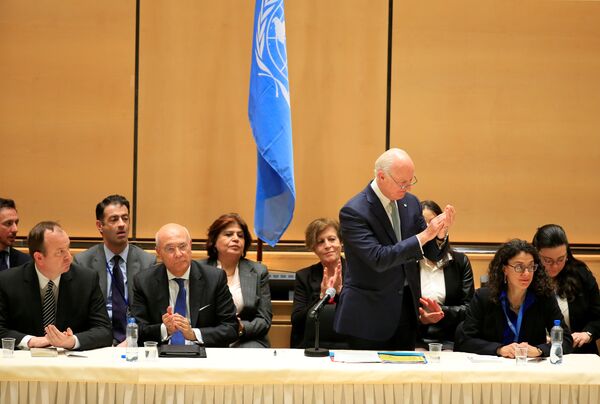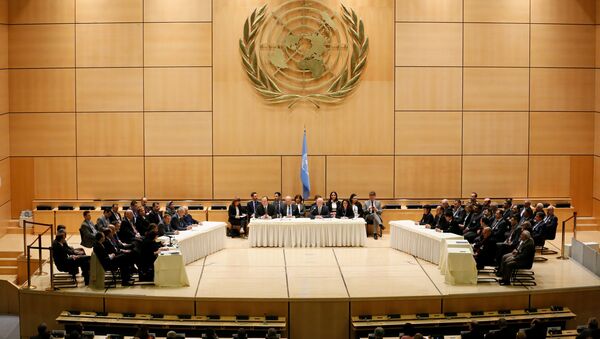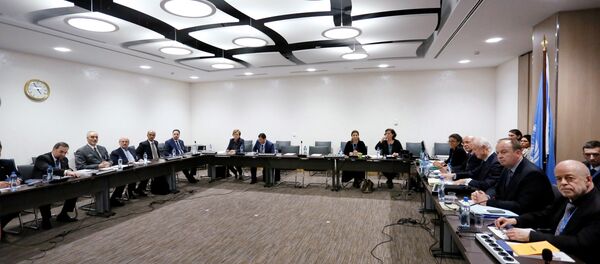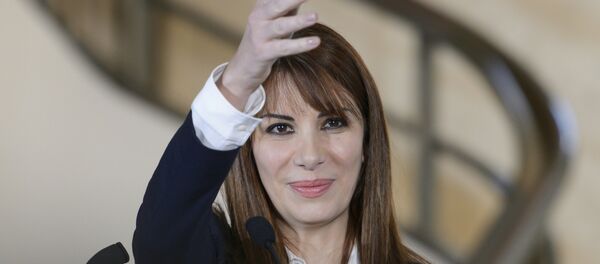The Syrian opposition sees the creation of an interim government as its top priority, National Coalition for Syrian Revolution and Opposition Forces' member, Mohammed al-Shemali, told Sputnik Turkiye.
"Twenty representatives from the Syrian opposition are participating in the Geneva talks. On the part of the official [Syrian] government 11 people are involved. Nothing definite can yet be said. We have yet to start a full discussion, only some general points have been considered. It is unclear for how many days the negotiations will go on, they could be suspended tomorrow or on any other day. We demand the creation of an interim government [in Syria] at these talks. This is our basic requirement," al-Shemali said.
"The other party [the UN] demands a transition period, a Constitution and elections," the opposition representative said, "Our top priority is the formation of an interim government [in the first place]. Time will tell whether or not we will achieve our goal."
According to al-Shemali, the Syrian government is "unwilling" to seek new ways to settle the crisis.
"What the [Syrian] authorities are pushing ahead with is the cessation of hostilities and the continuation of the mutual ceasefire regime," he said, expressing skepticism regarding the prospects of the Geneva talks.
He added that the opposition has not yet held "direct negotiations" with the Assad government. However, according to al-Shemali, the opposition representatives have confirmed their readiness to talk to the official Syrian government directly.

For his part, Abdul Hakim Bashar, vice president of the National Coalition for Syrian Revolution and Opposition Forces, told Sputnik that the Syrian opposition's High Negotiations Committee (HNC) will hold talks Wednesday evening with Russia's Deputy Foreign Minister Gennady Gatilov.
Bashar revealed that the HNC will focus on three major issues- the ceasefire, a possible attack on Ghouta, and the political solution for Syria.
On February 28, the Astana platform members of the Syrian opposition told Sputnik that they were going to meet with Deputy Foreign Minister Gatilov the next day.
"We will discuss three topics with the Russians — the ceasefire, a planned attack on Ghouta, and the political solution," Bashar said.
However, while endorsing Ankara's efforts to defeat Daesh (ISIS/ISIL), the HNC opposes the presence of any other foreign powers, including Russia and Iran, in the country.
"As long as the Turks are fighting ISIS [Daesh], it's good for the Syrian people," Bassam Barabandi, a political advisor to the HNC, told Sputnik Tuesday, claiming that neither Russia nor Iran were targeting Daesh.
"We always prefer to have the Syrian national forces fight ISIS [Daesh]," he added. "We don't need any foreign powers."
"It is difficult to create a joint opposition delegation because each platform differs from the others," Kurdish politician and member of the Syrian Democratic Council opposition party Reyzan Heidu told Sputnik on Wednesday.
"The creation of the joint delegation under the common platform and with same thoughts… is at the moment impossible," he said.
To add insult to injury, the Syrian Kurds, the largest ethnic minority in Syria, have yet to be invited to the talks.
"We have always advocated and continue to advocate the Syrian Kurds' participation in the [Syrian] negotiations," Russian Permanent Representative to the UN Alexei Borodavkin told reporters at the beginning of the Geneva talks.
Semyon Bagdasarov, Head of the Center for Middle Eastern and Central Asian Studies, echoes Borodavkin.
"This is a real military force, which holds the key not only to 70 percent of the Syrian-Turkish border, but also to the water resources of the Euphrates River, which is crucial for Syria. Negotiations without [the Syrian Kurds] will prove futile," Bagdasarov told RIA Novosti, commenting on the matter.
On the other hand, it is equally important not to allow Islamist extremist groups banned by the UN Security Council to penetrate into the negotiations.
"We cannot allow for extremist circles from organizations banned by the [UN] Security Council to leak into this political process," Russian Foreign Minister Sergey Lavrov said Wednesday, "I hope that the Geneva format will not be disrupted, and just like the Astana format, it will continue to play an important role in promoting the Syrian settlement."




